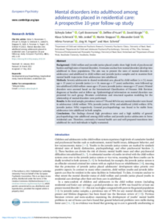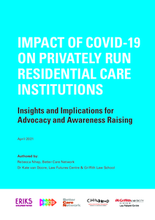Displaying 21 - 30 of 138
Organised jointly by ENIL-ECCL and Disability Rights Defenders, this webinar on November 22, 2022, featured speakers from Sweden, Slovenia and Scotland on the UN Guidelines on Deinstitutionalisation, including in Emergencies.
This article addresses the predicament of family service systems being built on parents’ voluntary participation and the need for parental consent, which may block children’s right to services. It examines parental consent and the impact of parental non-consent for children’s opportunities to receive protection and support in Swedish child and family welfare.
Child welfare and juvenile justice placed youths show high levels of psychosocial burden and high rates of mental disorders. It remains unclear how mental disorders develop into adulthood in these populations. The aim of this study, based on adolescents in Swiss residential care, was to present the rates of mental disorders in adolescence and adulthood in child welfare and juvenile justice samples and to examine their mental health trajectories from adolescence into adulthood.
Previous studies have shown that mental health disorders (MHD) among parents might be an important mechanism in the intergenerational transmission of out-of-home care (OHC). The current study aimed to further study this interplay by investigating the associations between OHC and MHD within and across generations in a Swedish cohort.
यस अध्ययनले सातवटा केन्द्रित देशहरूमा २१ अर्ध-संरचित अन्तर्वार्ताहरू समावेश गरी गुणस्तरीय अनुसन्धान अध्ययन सञ्चालन गरेर निजी रूपमा सञ्चालित र वित्त पोषित आवासीय हेरचाह संस्थाहरूको सानो संख्यामा COVID-19 को प्रभावको अन्वेषण गर्दछ।
This webinar, the fifth in the Transforming Children's Care Webinar Series focused on a new study ('Impact of COVID-19 on Privately Run Residential Care Institutions: Insights and Implications for Advocacy and Awareness Raising'). The study, comprising 21 semi-structured interviews across seven focus countries, explores the effect of COVID-19 on a small number of privately run and funded residential care institutions.
This study explores the effect of COVID-19 on a small number of privately run and funded residential care institutions by conducting a qualitative research study comprising 21 semi-structured interviews across seven focus countries.
In this study, the authors examine the structure and function of professional social workers’ follow-up questions in assessment talk with adoption applicants.
The overall aim of this article to gain updated knowledge on how children and youth who have received or are receiving child welfare (CW) interventions from the Nordic CWS fare in relation to suicidality.
This article from the Guardian tells the story of an adult adoptee, adopted from Chile to Sweden, whose search for her biological mother revealed that she had been "stolen" from birth. The article describes how many women in Chile in the 1970s and 80s, mostly from poor and minority backgrounds, had been tricked or coerced into giving up their babies for international adoption, as part of a national strategy to eradicate childhood poverty which began during the military dictatorship of Augusto Pinochet.




